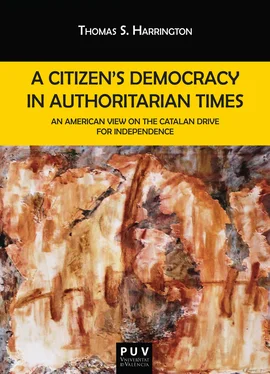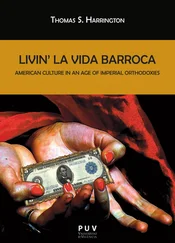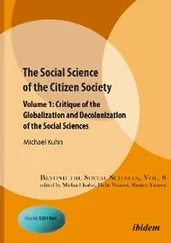The Federalism that would dominate the short-lived Republic (which until 1870 or so had existed as a splinter tendency of the mid-century “liberalism” outlined above) was, as one would expect, inherently hostile to the designs of centralism. This does not mean, however, that it was necessarily sympathetic to the historistically determined identities of Spain’s non-Castilian cultures. Indeed, if there was one thing that appears to have doomed the First Republic to a short life, it was its general negligence in the realm of culture-planning, that is, its leaders naïve proudhonian belief that a population’s sincere desire to form both local and supra-local polities was enough to guarantee the coherence and survival of the very same entities. This extreme faith in the voluntaristic capacities of the citizenry meant that the “management of memory”—be it the well-codified cultural repertoire of the center or the incipient cultural repertoires of the periphery—was largely ignored. In this context then, we can speak of the First Republic as a time within which the circulation of the time-tested repertoire of monistically-inspired tropes of national identity was not replaced, but rather momentarily suspended.
It was a recognition of this culture-planning failure that inspired Almirall’s particularisme, the first modern iteration of the family of socio-political theory we refer today as Catalanism. Originally attracted to public life by the ideas of Pi i Margall, the prime ideologist of the failed Federal Republic, Almirall understood instinctively that his mentor’s vision was doomed to future failure if it did not take into account the important role of historically-inscribed linguistic and cultural artifacts, (as well as the autochthonous the institutions necessary for reproducing and distributing them) in the creation of enduring political allegiances. In 1879, for example he founded El diari català, the first daily newspaper ever written in the language of the region. Through this and other initiatives, he sought to effect a fusion of the dominant features (minus the marked centralism) of the French nationalistic tradition (universalism, egalitarianism) and Romantically-inflected German historicism with its emphasis the enduring power of language and local custom.
But if the disruption of the Castilianist discourse during the First Republic was for Almirall a useful, if flawed, incitement to a potentially wide-ranging redefinition of the Spanish state, it was an for Cánovas, the prime architect of the political order of the Restoration, a frightening anathema. In his Discurso sobre la nación (1882), for example, resurrects all of the key elements of the hierarchical, imperialistic, and religiously imbued concept of Castilian identity that had enabled both Spain’s meteoric rise and its agonizingly slow fall, going so far at one point to characterize the less widely extended linguistic codes of a nation as the “plantas parásitas” (Cánovas s.n.) in the nation’s otherwise ordered and fundamentally unitary linguistic ecosystem. For all his embrace of principals forged in the past, however, Cánovas, avoided his conservative predecessors’ tendencies toward intellectual insularity and Olympian disdain of modern progress. For example, he was acutely aware of the latest developments in nationality theory such Renan’s “What is a Nation?” And rather than simply ignore that famous talk delivered to great effect in Paris six months before his own, he forcefully refutes it. Through this speech and hundreds of others like it, the fearsome wordsmith greatly updated and expanded Spanish traditionalism’s dialectical toolbox. In so doing, he was implicitly recognizing the increasing importance of urban intellectuals (like himself) and their institutions (like the Ateneo of Madrid where he gave the speech) in the creation and maintenance of any future consensus on the issue of national identity.
Cánovas’s efforts to effect a rhetorical facelift of Castilian traditionalism in the political arena were paralleled by those of Menéndez Pelayo (a fellow Conservative member of parliament) in philology, the new “science” of culture whose genesis and development is intimately linked to the rise of a largely hermetic, hegemonic and temporally infinite concept of German nationalism during the early and mid 19th century. In keeping with the comparative nature of the German model of philology pioneered by thinkers such as Friedrich Schlegel and Franz Bopp, Menéndez Pelayo demonstrated a sincere interest in all of the linguistic traditions of the Peninsula. However, (and here again we see his kinship with his German disciplinary forebears), he was nonetheless possessed of belief in the existence of a clearly hierarchical relationship between them. Similarly, as a devout Catholic, he was strongly imbued with Spanish traditionalism’s long-standing belief in a link between this Castilian-forged unity and the Church. In short, the prodigious labor of Menéndez Pelayo was to become the cornerstone of a whole new and revitalized Castilianist culture-planning project. In terms its core postulates, it differed surprisingly little from the vision enunciated four hundred years before by Nebrija. However, its ostensibly “scientific” and “dialogic” nature appealed greatly to a growing urban intellectual class that wished to expunge its long-standing sense of inferiority versus the cultures of Northern Europe. In this sense, the cultural project of Menénedez Pelayo and that of his political correlate, Cánovas, might be compared with those of the 16th-century Jesuits and the 20th-century members of Opus Dei. In all three movements, the leadership recognized a need to modernize both the theory and practice of Spanish intellectual and civic life. However, none was willing to dispense with any of their fundamental socio-religious convictions to make this happen.
The success of this philologically-fueled revival of the Castilianist repertoire of cultural options was not lost on upon the generation of Catalanists that followed Almirall and began to come of age during the late 1880s and early 1890s. Like the neo-traditionalists of Castile, Prat de la Riba, Cambó, Puig i Cadafalch and Torras i Bages were conservative and Catholic, and consequently naturally given to monistic and hierarchical conceptualizations of national and social identity. Not surprisingly, they tended to view Almirall’s social progressivism and disposition (however theoretical) to multipolar, pan-Iberian solutions to the nationalities problem with suspicion. It was thus not long before they began creating an explicitly historicist apology for the singularity of what they saw as their one and only true nation: Catalonia. The first great public demonstration of this newly politicized organicist vision of the Catalan nation was the famous political manifesto of la Unió Catalanista, Les Bases de Manresa (1892) Arguably more important in the long-run however, were initiatives such as the Cercle Artistic Sant Lluc, an artists collective run under the theoretical tutelage of Torras which sought to give expression to what they viewed as the “essential,” spiritually-inspired elements of Catalan identity, [7]and in this way, counteract modernisme’s “foreign” brand of secular cosmopolitanism. It would be this brand of Catalanism that would be politically ascendant from 1888 onward.
The first formulations of Basque national identity, generated by Sabino Arana during the same decade, grew out of a similar social and religious environment. The major difference in the Basque case was the movement’s much higher degree of distrust toward both universalizing modernity and the Castilian center, the latter of which it saw it (quite mistakenly) as being wholly dominated by the former. This stridency can be traced, in great measure, to the effects of the long-standing Carlist movement in that part of Spain, and more specifically still, the family of Arana. Unlike the conservative Catalan bourgeoisie which had been enticed into a certain complicity with the Castilian center through the granting of relatively new mercantile privileges in the Caribbean, the rightward extreme of the Basque social spectrum had been pursued by Castilianist armies during the same period. Further differentiating the two movements, was the fact the emergent ideological and cultural praxis of La Unió Catalanista had been forged in active, and often quite personal dialogue, with their both Almirall’s group and the “worldly bohemians” of modernisme, interchanges made possible by “bridge” institutions and figures such as El Ateneo, El Centre Català Maragall, Ramón Casas, Joaquim Casas-Carbó, Masso i Torrents y Donènech i Montaner. No such comparable intramural dialogue was present in the incipient Basque movement of national identity.
Читать дальше












